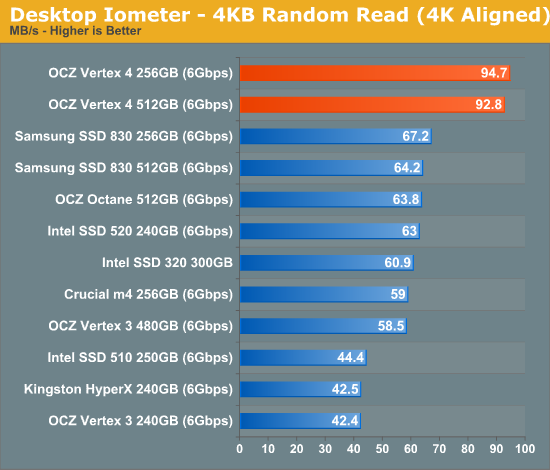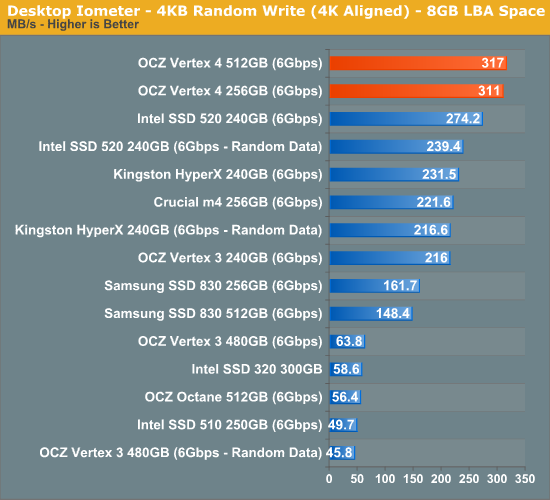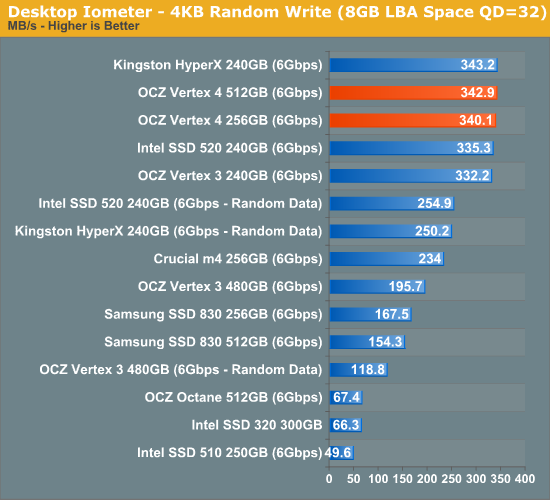OCZ Vertex 4 Review (256GB, 512GB)
by Anand Lal Shimpi on April 4, 2012 9:00 AM ESTRandom Read/Write Speed
The four corners of SSD performance are as follows: random read, random write, sequential read and sequential write speed. Random accesses are generally small in size, while sequential accesses tend to be larger and thus we have the four Iometer tests we use in all of our reviews.
Our first test writes 4KB in a completely random pattern over an 8GB space of the drive to simulate the sort of random access that you'd see on an OS drive (even this is more stressful than a normal desktop user would see). I perform three concurrent IOs and run the test for 3 minutes. The results reported are in average MB/s over the entire time. We use both standard pseudo randomly generated data for each write as well as fully random data to show you both the maximum and minimum performance offered by SandForce based drives in these tests. The average performance of SF drives will likely be somewhere in between the two values for each drive you see in the graphs. For an understanding of why this matters, read our original SandForce article.
Random read performance is staggering - a good 40% higher than anything else we've tested. While the cutoff for usefulness on a client drive is likely much lower than what even the Octane could deliver, this sort of performance bodes very well for OCZ's enterprise ambitions.
Randomly write performance is also just excellent. SandForce's peak numbers come close, but throw in any sort of incompressible data and they quickly take a step back while the Vertex 4 is able to deliver. Again, I'm actually more interested in these numbers from an enterprise workload standpoint but heavy client users will definitely not be disappointed.
Many of you have asked for random write performance at higher queue depths. What I have below is our 4KB random write test performed at a queue depth of 32 instead of 3. While the vast majority of desktop usage models experience queue depths of 0 - 5, higher depths are possible in heavy I/O (and multi-user) workloads:
SandForce always scaled well at higher queue depths, but again we're looking at best case performance for the SF-2281. Move towards incompressible data and the Vertex 4 is alone at the top.













127 Comments
View All Comments
Freddy G. - Wednesday, April 4, 2012 - link
I want an SSD now for my gaming system, as boot and games drive, what u guys think should be better? Crucial m4 or Corsair Force GT? BTW Im going to start with a 120gb version in the meantime.kyuu - Wednesday, April 4, 2012 - link
Whichever is cheaper. Performance-wise, you won't notice a difference. I promise.tynopik - Wednesday, April 4, 2012 - link
don't think you said what you meantAnand Lal Shimpi - Wednesday, April 4, 2012 - link
I think you're quite right :) Fixed.Take care,
Anand
ViviTheMage - Wednesday, April 4, 2012 - link
I have two M4's, I find the iops to be as delicious as milk shakes.gloinsir - Wednesday, April 4, 2012 - link
What's up with the huge variance in performance between the Samsung 830 512MB and 256MB drives? On the light workload test - http://www.anandtech.com/show/5719/ocz-vertex-4-re... - The 256MB version is 25-50% faster on all tests. That's an enormous difference.Is there a firmware difference between the two drives?
Thanks for a great review. I hope the firmware updates and reliability work out. Competition is good!
Anand Lal Shimpi - Wednesday, April 4, 2012 - link
There is indeed a firmware difference between the drives - unfortunately Samsung's latest firmware won't install on the 512GB drive for whatever reason, so it's left with lower performance.Take care,
Anand
ckryan - Wednesday, April 4, 2012 - link
Are you sure that's a FW difference? I didn't really notice much of a difference overall between my 256GB and 512GB 830s, but there are differences.My 512 on 01FW pulls down substantially higher QD1 4K RWs than the 256 on 01 or 03FW, but there are other differences. I think there are slightly different characteristics between the 32gbit and 64gbit dies.
ViviTheMage - Wednesday, April 4, 2012 - link
Seriously, these are probably the most nutritious, and scrumdidaliumpcious iop looking SSD's I have seen.edlee321 - Wednesday, April 4, 2012 - link
Im another one of those crucial m4 fans, you cannot get better bang for the buck than these drives, especially for power consumption and reliability.The difference between 4k read from one ssd to another is not important, reliability and idle power consumption is whats important.
If anand can run a one month stress test using random uncompressable data on all the current drives in his possession that would be great. I want to see what drive lasts out the longest.